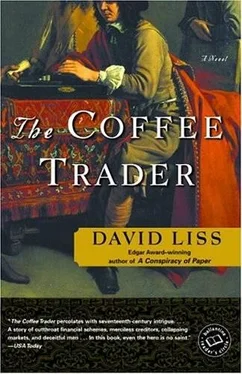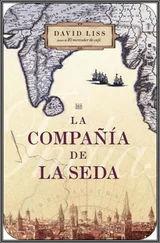Miguel turned away. Few men were as well connected on the Exchange as Parido, and if he had decided that he wished to end his animosities with Miguel, this transaction could be the first step in a friendship that would help extricate him from debt. Would Parido attempt to worsen Miguel’s affairs in full view of the world? Still, Parido had been sour for nearly two years, and Miguel sensed something sinister in this new altruism.
His instincts told him to reject the offer, to hang on to these futures and see what the market offered him, but dare he follow his instincts? The thrill of being rid of the cursed futures was tempting. He could end this month with a profit. Next month he could trade in whale oil-another guaranteed gain-and begin his coffee venture. He might at this moment be staring at a turning point in his fortune.
Faced with a grave decision, one on which his future might well depend, he asked himself what had become the only question that came to mind in these circumstances: What route would Charming Pieter take? Would he defy Parido and follow his instincts, or would he surrender his will to the man who had once been his enemy but now protested friendship? Pieter, Miguel knew, never foreclosed an opportunity, and it was better to make a man who intended trickery believe he had succeeded than to expose him to his face. Pieter would follow Parido’s advice.
“I’ll make the trade,” Miguel said at last.
“That is the only thing to do.”
Perhaps it was. Miguel should have been euphoric. Perhaps he would be in a few hours, when the inexpressible relief of being rid of those poisonous shares finally seemed real. He said a prayer of thanks, but even as he recognized his luck he could not quite shake the bitter taste from his mouth. He had liberated himself from these difficulties only with the help of a man who, two weeks before, would have gladly sewn him in a sack and tossed him into the Amstel.
It might be as Parido said-he wished only to mend their rift-so Miguel turned to the parnass and bowed in thanks, but his face was dark. Parido could not mistake its meaning. If this turned out to be a trick, Miguel would have his revenge.
from
The Factual and Revealing Memoirs of Alonzo Alferonda
It will be hard to explain to my Christian readers precisely what the cherem, excommunication, can mean to a Portuguese Jew. To those of us who had lived under the thumb of the Inquisition, or in lands such as England where our religion was outlawed, or in places such as the cities of the Turks where it was barely tolerated, to dwell in Amsterdam seemed a small taste of the World to Come. We were free to congregate and observe our holidays and our rituals, to study our texts in the light of day. For us who belonged to a small nation, cursed with having no land to call our own, the simple freedom to live as we chose was a kind of bliss for which I never, not for a single day I lived with my brothers in Amsterdam, forgot to give my thanks to God.
Of course there were those cast forth from the community who cared not at all. Some were happy to leave what they saw as an overly scrupulous and demanding way of life. They would look at our Christian neighbors, who ate or drank what they liked, for whom the Sabbath, even their Sabbath, was but another day, and they would see those freedoms as a release. Yet most of us knew who we were. We were Jews, and the power of the Ma’amad to take away a man’s identity, his sense of self and belonging, was truly terrifying.
Solomon Parido did all he could to make me an outcast, but in truth I might have gone far away and changed my name. No one would have known I was Alonzo Alferonda of Amsterdam. I knew deception the way other men knew their names.
And such was my plan. I would do it, but not quite yet. I had plans for Parido, and I would not leave until I had seen them through.
Hannah believed she knew what coffee was, but she had no guess as to why Daniel would want to keep Miguel from trading in it, or why Miguel would think anyone would want to buy the stuff. Miguel and Daniel had talked suspiciously about coffee, and there, in Miguel’s cellar, she found a sack of curiously pungent berries the color of dead leaves. She put one in her mouth. It was hard and bitter, but she chewed it anyway despite the vague ache in her teeth. Why, she wondered, would anyone care about so foul a substance?
She supposed she probably ought not to be rummaging around in Miguel’s things, but it wasn’t as though she would let her husband know what she found. In any case, Miguel never told her anything about his life, and how else would she learn if she didn’t pursue these things herself? Only through her own guile had she learned about his debts and his troubles with Parido and the strange threatening notes he’d been receiving. Annetje, whom Hannah sometimes sent to follow Miguel at a distance, told her he maintained a curious friendship with a pretty Dutch widow. One time Annetje had even led Hannah to peer through the window of a tavern and she’d seen the woman for herself, proud and convinced of her own importance. What had this woman ever done that was so significant, other than marry a man with money and then outlive him? Another time, when the two of them had clearly been drinking, he brought the widow home, believing that she and Daniel were off eating with one of his business associates. The widow had stared at her until Hannah blushed, and she and Miguel hurried outside, erupting in childish laughter. Hannah thought that if Miguel wanted to be friends with a woman, surely he ought to choose one far less silly, one who lived in the same house.
She opened the bag of coffee again and took out a handful of the berries, letting them run through her fingers. Maybe she should eat more of them, develop a taste for their bitterness. When Miguel someday suggested that she eat coffee, she could laugh and say, “Oh, coffee, how delightful!” and toss a handful in her mouth as though she had been eating bitter fruit all her life-which, after all, she had. She carefully picked out another berry and crushed it with her back teeth. It would take some time before she could find it delightful.
Still, there was something pleasant about it. By the time she’d eaten her third berry, she’d come to like the way the bits of coffee shards shattered in her mouth. The flavor seemed to her less bitter, even slightly satisfying.
Sneaking through Miguel’s things and eating his secret berries left her feeling guilty, which was probably why Annetje caught her by surprise when she went back upstairs. The girl slyly raised her narrow eyebrows.
“It’s almost time to go, senhora,” she said.
Hannah had been hoping she’d forgotten. Why should the girl even care if they went or not? Well, Hannah knew why: it made Annetje feel powerful. It gave her something to hold over Hannah, to get from her another few guilders when she wanted them, to get Hannah to look the other way when she found Annetje frittering away her time with some Dutch fellow instead of tending to her chores.
There was a place in their own neighborhood but Hannah had never dared to visit it, not with the thick crowds that gathered on the Breestraat and wide walkway on their side of the Verversgracht. When they went, they went instead down near the docks, just off the Warmoesstraat, trekking circuitously through crooked streets and over steep bridges. Only when they were far from the Vlooyenburg, a good distance past the Dam, walking along the crumbling narrow alleyways of the oldest part of the city, did Hannah pause to remove her veil and scarf, terrified as she did so of the Ma’amad spies who were known to lurk everywhere.
Covering herself had been one of the most odious adjustments to life in Amsterdam. In Lisbon her face and her hair had been no more private than her outer coat, but when they’d moved to this city, Daniel had told her no man but he could ever see her hair again, and she must cover her face when in public. She later learned that nothing in Jewish law demanded that women hide their faces. The custom had come from the Jews of North Africa, and it had been adopted here.
Читать дальше












